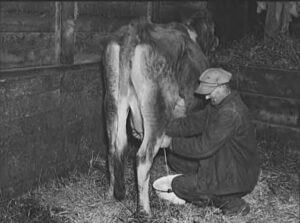Spilt Milk
My upbringing took place on a retired dairy farm in NC, in the days when cows were milked by hand into a milk pail placed right under the spigots. Occasionally a cow might lift a foot to kick at a pesky fly crawling on her underside and then misplace it right into the milk bucket. The milk was ruined, it was an udder mess, and would be dumped out on the ground, generally by a subsequent movement of the cow’s foot. Since it could not be retrieved, “There was no need to cry over spilt milk.”
On occasion, this phrase is borrowed from yesteryear, and endued with interesting new application. e.g. When you have done something that cannot be undone, and the consequences prove to be disappointing, or even detrimental, you might feel badly about it for a while, but you have come to accept, “There is no need to cry over spilt milk.” Perhaps this idea resonates with you because of things done in your past, decisions you have made that hurt still. If only you could erase the consequences of prior choices, perhaps you could finally experience lasting peace—or so you think. But then that hopeless and helpless feeling arises in your heart and you conclude again, “There is no need to cry over spilt milk.”
But wait! Perhaps there is something that can be done to alleviate the penalties accrued in your “less than perfect” past. Jesus, God’s Son, came to earth to die for the sins of the world, “to open their eyes, and to turn them from darkness to light, and from the power of Satan unto God, that they may receive forgiveness of sins, and inheritance among them which are sanctified by faith that is in me. (Acts 26:18)” He rose from the dead and lives, even now, at the right hand of God the Father, and offers forgiveness in exchange for faith. He pleads, “Come unto me, all ye that labour and are heavy laden, and I will give you rest. Take my yoke upon you, and learn of me; for I am meek and lowly in heart: and ye shall find rest unto your souls. For my yoke is easy, and my burden is light. (Matthew 11:28-30)” Truly, for those of us who call Him, Lord, “There is no need to cry over spilt milk.”




